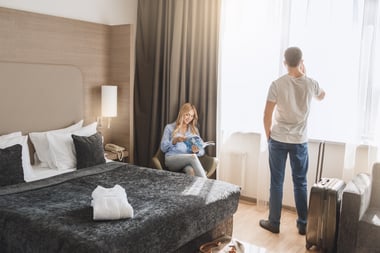This week, HOTREC (the European trade association of hotels, restaurants and cafes) released a hotel distribution study based on responses from 2,000+ hoteliers.
The study indicated that nearly 25% of stays were generated through OTAs in 2015, and that the ‘narrow parity clauses’ designed to increase OTA competition – and lower commission rates for hotels – have done little to nothing for most hotels surveyed. Furthermore, as OTA bookings rose, shares of direct bookings have dropped to 55%.
This study certainly goes a long way towards illuminating why so many independent hoteliers feel so strongly about promoting direct bookings and why their relationships with OTAs, although necessary and appreciated, are also often contentious.
HOTREC’s study created a definite splash. A travel agency group, ETTSA, which includes Expedia and many Expedia-owned OTAs as members, responded to the study with the following: “European hotels should consider the effort that online travel agencies put into the marketplace before rubbishing the system.”
They claim that narrow rate parity clauses represent the best solution, although they do not address the fact that most hotels have seen no reduction in commissions since their introduction. In fact, they say that hotels’ “claims that distribution is too expensive” should not be taken into account at all, although these very claims, along with the clear duopoly of Priceline and Expedia ruling the marketplace, are what led to narrow parity clauses in the first place.
For the full stories, check out the articles below. What do you think?
Independent Hotels Increasingly Dependent on OTAs
HOTREC unveils the results of its second hotel distribution study: The results show an increasing dependency of hotels on Online Travel Agents (OTAs), as nearly one out of four overnights was generated through this channel in 2015. Over the last few months, hotels have not experienced increased competition between OTAs, which was one of the expectations linked to the introduction of the so called ‘narrow parity clauses’. The vast majority of them reported not having experienced any decrease of commission rates to the OTAs.
In parallel to the rise of the share of OTAs in hotel bookings, the share of direct bookings has dropped to 55%.
“The study clearly shows that online platforms are steadily acquiring bigger and bigger shares in hotel bookings, while the hotels’ own distribution channels are on a decline making dependency on OTAs growing. The situation is especially critical as it seems that the OTA market tends to become a duopolistic (or even monopolistic?) one in Europe, with one player (Booking.com) controlling closely 2/3 of the market” – said Christian de Barrin, CEO of HOTREC.
Travel Agency Group Hits Back at European Hotels Over Distribution Criticism
In direct response to the HOTREC study above, European Technology and Travel Services Association (ETTSA), which counts Expedia Inc brands Expedia, Hotels.com and Venere amongst its members (but not any Priceline Group-owned sites), says European hotels should consider the effort that online travel agencies put into the marketplace before rubbishing the system.
ETTSA declares that hoteliers will “evidently claim that their distribution is too expensive, but these claims should not be used as a basis for assessing the effectiveness of the introduction of narrow rate parity”.
HOTREC members, in its survey, say that they haven’t seen any increase in competition or any change to commission levels as a result of narrow parity clauses in the last 12 months.
While hoteliers overwhelmingly claim that narrow rate parity has not increased competition or reduced commission levels for hotels – with the exception of several large branded hotels – ETTSA says that the narrow rate parity clauses are the best solution for all parties.
What do you think?



